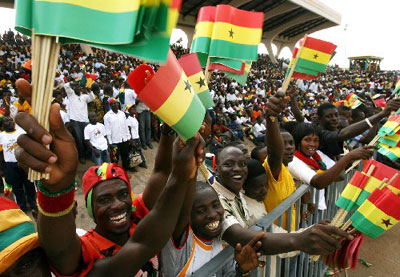I reject the claim that the western media deliberately portrays Africa in a negative light. My argument has always been that the image you put out is the image they will carry. Countries that want to be portrayed as a forward, looking democratic nations, allow their citizens to freely choose their leaders. On the other hand, if citizens in a nation turn on each other and start chopping off arms, you shouldn’t expect to be portrayed as a land of cherubs.
The following is an editorial of the Winnipeg Free Press, a newspaper in Canada. They have some pretty nice words to say about Ghana. Having dealt a little bit with the Canadian media, I can say such a positive editorial is a rarity. Good news stories like this (about Africa) are hard to come by in the North American media. And so in moments like these, I can’t help but feel proud to be a Ghanaian. Moments like these are few and far between. So come on, let’s toast to that….
Good news from Africa
WITH all the bad and often bloody news coming out of Africa today — Zimbabwe, Kenya, Guinea, Nigeria, the Congo — it is a relief to finally hear something positive, even optimistic to counter the depression. A new government installed in the West African nation of Ghana this month after a hard-fought election in December may provide that tonic.
For the second time in its 50-year history of independence, Ghana is being held up as an example for other sub-Saharan governments to emulate. With goodwill and great determination, this second chance may be more successful than the first — all the signs are positive.
In 1957, Ghana became West Africa’s first independent nation under the elected government of Kwame Nkrumah, the first president. It was seen as a beacon for the rest of Africa, an example of how the emerging nations could break the shackles of colonialism and become free and prosperous democracies.
But that was not the example that Nkrumah set for Africa. Instead he became a dictator — The Redeemer, he called himself, ordering legions of uniformed school children to march through the streets of Accra singing "Nkrumah never die / He forever live."
That was an example most African leaders found easy to follow and the continent has never recovered from the excesses that The Redeemer taught it. Ghana itself, however, is recovering. After a bloody interregnum following two successive coups, the last led by an air force lieutenant, Jerry Rawlings, who did an astonishing about-face and returned the nation to its long-lost democracy in 1992. The inauguration of John Atta Mills this month confirms that the democracy is taking root, that it may be, as the new president said, "The dawn of a new era" for Ghana.
The election was not without incident but international observers declared it free and fair and most of the country’s own politicians — including the losers — accepted the reality of it.
This was all the more remarkable considering the closeness of the vote — Mr. Atta Mills received 50.2 per cent of the vote in a runoff contest between him and Nana Akufo-Addo, the leader of the party that had previously formed the government. That is a victory margin of four-tenths of one per cent, a slim win by the standards of any democracy.
This is clearly a triumph for Ghana, which has been building its political legitimacy and international credibility since Mr. Rawlings — who is still active in Ghanaian politics — abandoned dictatorship.
It can also be a good thing for black Africa where, outside of Botswana and South Africa, democratic principles are held onto only precariously. There has been a recent coup in Guinea, a doubtful vote in Nigeria, fixed votes in Kenya and Zimbabwe and outright civil war in the Congo. If Ghana stays the course, it can only give hope to all Africans that there will, one day, be a new dawn for them as well.


